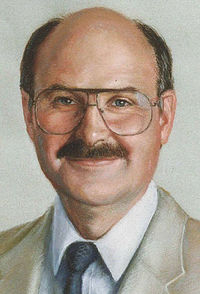Mike Harcourt President
Michael Franklin Harcourt (born January 6, 1943) served as the 30th Premier of the province of British Columbia in Canada from 1991 to 1996, and before that as the 34th mayor of BC's largest city, Vancouver from 1980 to 1986.Harcourt was student council president at Sir Winston Churchill Secondary School and studied at the University of British Columbia, where he obtained a Bachelor of Arts and a Bachelor of Laws. Harcourt served as a Vancouver alderman from 1973 to 1980, and as Mayor of Vancouver from 1980 to 1986. As mayor, his term in office was dominated by planning for Expo 86, an event that saw many new developments come to the city.He was first elected to the British Columbia Legislature in the 1986 British Columbia provincial election. He became the leader of the British Columbia New Democratic Party (NDP) and the Leader of the Official Opposition in the following year. He was considered to be a moderate within the ranks of his social democratic party.In the 1991 provincial election, Harcourt led the NDP back to power, defeating the Social Credit party led by Rita Johnston. This marked the second time that the NDP had ever been in power in BC, and the first since 1975.Harcourt resigned as premier in February 1996 as the result of "Bingogate", a scandal in which an NDP member, former B.C. MLA and MP, David Stupich, used money raised by a charity bingo to fund the Party. While Harcourt had nothing to do with the scandal, he took political responsibility for it. He was succeeded as Premier of B.C. by Glen Clark, who also ended up resigning as the result of another scandal.After serving as premier, Harcourt became associated with the University of British Columbia (UBC). He was involved in research relating to sustainable development and cities.He was severely injured in a near-fatal fall at his cottage on Pender Island in November 2002, which resulted in a severe spinal-cord injury. The former Premier received a widespread outpouring of sympathy and support from his fellow British Columbians and his rapid recovery astonished doctors. He spent several months at the world-renowned facility GF Strong. He later published a book about his ordeal, called Plan B.He was named as a special advisor to Prime Minister Paul Martin on cities on December 12, 2003.His latest book, City Making in Paradise, was released in August 2007.In November 2007, he received an honorary doctoral degree in Law (LL.D) from UBC. In February 2009 he was appointed associate director of the new UBC Continuing Studies Centre for Sustainability, where he will contribute to the development of educational programs that emphasize practical knowledge in tackling climate change and other sustainability issues.In the January 31st, 2014 issue of "High Country News", Harcourt stated he was recruited in the 1960's by an activist group to oppose a freeway that would have connected the Trans-Canada Highway to downtown Vancouver. 'You've been hired to stop the freeway,' he recalled in the article. As a result, the proposed east-west freeway was not completed. This expressway would have provided entry into the city in less than five minutes instead of the 30 minute (or longer) trip it has become today along residential streets. As a result of this cancelled freeway and others associated with it; commuters coming into Vancouver suffer from lengthy delays on a daily basis as they try to navigate clogged city streets that were never meant to carry the freeway-volume traffic that now uses them. Because these highways were never built, Vancouver is now the most congested city in North America... worse than Toronto, worse than New York and worse than Los Angeles. The cancellation of these freeways has decreased mobility, increased pollution and added additional cost to goods movement across the region.Harcourt revealed in April 2014 that he had allowed his NDP membership to lapse and now considers himself an independent. “I don’t know whether it’s a trial separation or a decree absolute," he told the Globe and Mail in an interview. Harcourt cited several complaints against his former party including former leader Adrian Dix's decision to oppose the Kinder-Morgan pipeline and the party's general disposition against mining, logging and other resource-extraction industries, the party's 2009 opposition to the BC Liberal government's proposed carbon tax, and the 2010 caucus revolt that forced the resignation of then-leader Carole James.Harcourt had repeatedly supported the legalization of cannabis and in May 2014 announced that he would be an advisor to True Leaf Medicine Inc., a Vernon-based start-up company seeking Health Canada approval to produce and sell medicinal marijuana.
Search
Politician
| monarch | |
|---|---|
| party | |
| successor |
